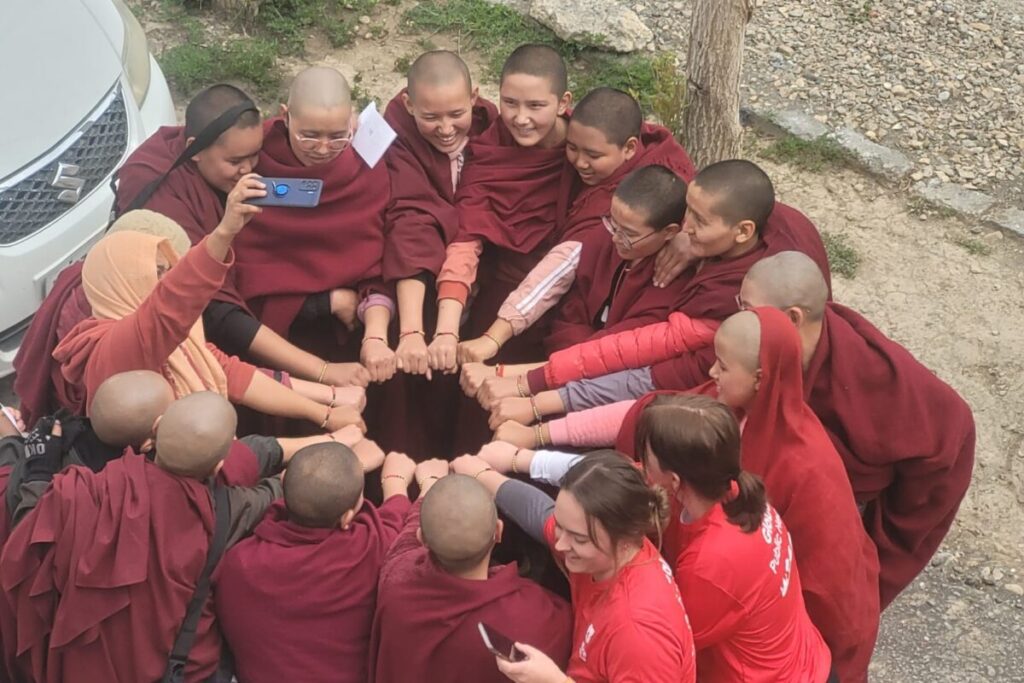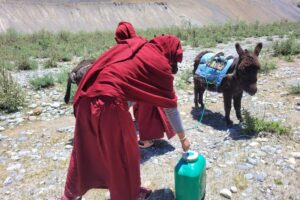Solar Power Helps Spiti Nuns Meet Water Needs During Winters
Mar 9, 2024 | Pratirodh Bureau
The nuns at Spiti's Pangmo Monastery say that after the installation of solar-powered water pumps they are able to uphold their spiritual commitments without other challenges (Photo by Chhering Norbu)
- At Pangmo Monastery in Himachal Pradesh, natural water sources freeze during winters, which makes fetching water, a challenging and time-consuming task for the Buddhist nuns that live there.
- Solar-powered water pumps were installed recently, with large tanks and a solar passive design, to store water. This ensures that the water doesn’t freeze.
- This has reduced the time and energy spent on collecting water, especially during winter, and has improved the quality of life for the nuns and the local residents.
The installation of solar water pumps has transformed the lives of the Buddhist nuns at the Pangmo Monastery in Himachal Pradesh, enabling them to maintain their daily prayer routine, especially during heavy snowfall when fetching water becomes challenging.
Pangmo is the only monastery for women in the Spiti region of Himachal Pradesh. It currently houses 58 nuns. During winters, the temperatures here dip to as low as minus (-) 30° Celsius, causing natural water sources to freeze. Under such conditions, fetching water becomes one of the most repetitive, physically demanding and time-consuming tasks.
Dolma Cheering, the person in-charge at the monastery, explained that the local residents in the village of Pangmo had to undertake back-breaking tasks to fetch water, many times a day.
Describing the difference that solar water pumps have brought to their lives, she stated, “During the summers, it is not that difficult to get water since the monastery is accessible by road and water tanks bring water. However, during winters, the situation worsens as the roads get blocked with heavy snowfall. Therefore, the local people had to travel three to four kilometres downstream to collect water from Spiti river, often leading them to skip their morning ritual. It was also impossible to negotiate with the tough terrain.”

She added that each day, a few nuns had to skip prayer to bring water on time. “However, with the solar water pumps, they no longer have to undertake this arduous journey, allowing them to focus on their religious practices, enabling individuals to uphold their spiritual commitments without the hindrance of logistical challenges,” Cheering shared.
The adoption of solar energy benefits not only the nuns, but also the 28 other families in Pangmo, predominantly comprising senior citizens. “With most of the younger generation relocating for better career opportunities, before the installation of solar water pumps, water had to be transported from the Spiti river using donkeys,” said a local resident, Tenzin. However, each trip could only yield two to four cans, which proved insufficient for families of four to five members. The older generation found it challenging to manage donkeys. The subsequent installation of these water pumps has alleviated these difficulties, allowing the residents to meet their own needs effectively.
The solar pump was installed by volunteers from Ecosphere, a Spiti-based social enterprise. Once pumped, the water is stored in large tanks within a solar-passive building to ensure that the water doesn’t freeze during winters. These water storage facilities have been built at a central location with easy access for the whole village.
Bringing water closer to homes to reduce the time and energy spent on collecting water, especially in the cold winter months, has significantly reduced drudgery and improved the quality of life, say the residents. The additional time available enables communities to invest their time in other productive activities throughout the year, such as childcare, family time and education, along with the opportunity for extra livelihood activities and other economic opportunities. Easier access to clean and contamination-free water also enables enhanced personal hygiene, a reduction in water-related diseases and an overall improvement in community health and village sanitation.
Chhering Norbu, a volunteer who offers technical support to the local residents to maintain the solar water pump, shared that they have installed six solar panels and kept two tanks that can store around 2,000 litres of water. “The nuns and local residents fill the water accordingly throughout the day and it is quite relieving. On a similar note, to reduce the consumption of fuels and associated carbon emissions, they have installed solar geysers, solar mud cookers and solar lights as well,” he added.
While talking about the maintenance, he stated that the village and the Buddhist monastery have formed a water committee, and every individual pays Rs. 50 monthly and Rs. 600 annually. They also avail free services for small maintenance work.
The volunteer team has also installed a greenhouse in which local residents are able to grow vegetables for their daily needs. The use of solar energy is also believed to align with the broader efforts of religious communities to minimise climate impact and promote responsible resource usage.
Collecting water in Spiti is incredibly challenging. The sources of drinking water are often located far away from the villages, which makes the task even more difficult. “Therefore, finding innovative solutions to address this issue and ensure a consistent supply of water throughout the year is crucial for the well-being of the people living in this region,” shared Chhetan, a nun at the Pangmo monstery.
(Published under Creative Commons from Mongabay-India. Read the original article here)
